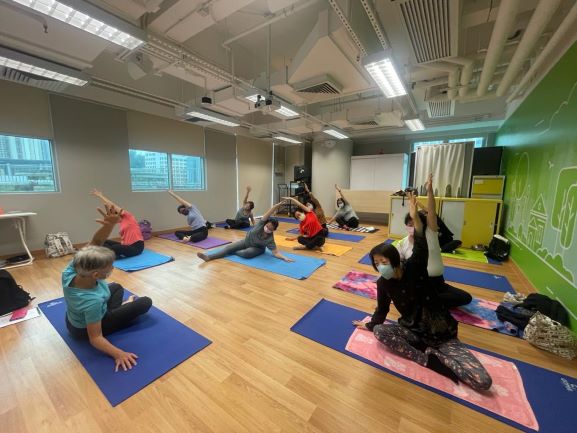How can we stay healthy longer

How can we stay healthy longer?
We’d probably all like to live long and healthy lives. But how feasible is this? And what can we do to stay healthy longer?
There are two main risks to our health as we age:
• Lifestyle related diseases (associated with physical inactivity and overeating, smoking and alcohol abuse – which increase the risk of heart attack, stroke, cancer and diabetes)
• Age related illnesses or disabilities as people live longer (like dementia, arthritis, sight and hearing loss).
So what can we do to reduce the risk of lifestyle related diseases?
As we report elsewhere on Age Watch a healthy lifestyle includes:
• Physical exercise (which can include dance) – good for both physical health and mental health.
• A healthy diet with plenty of fruit and vegetables, together with oily fish, lean white meat, oats, olive oil and nuts
• Avoiding sugary, salty and fatty processed foods where possible.
• Social networking and activity – as loneliness can be a health risk.
• Helping others and doing work (paid or voluntary) which we enjoy and which is valued by others – which also seems to have health benefits.
• Staying mentally active and continuing to learn and do new things – as it is suggested that this helps the brain build a cognitive reserve which can delay the onset of dementia.
• Not smoking or drinking too much alcohol – as studies of global health have shown these remain major causes of ill health across the world.
Are age related illnesses and diseases inevitable?
As we grow older the risks inevitably increase but, again, lifestyle (mental as well as physical) can have a protective effect.
For example choosing to study longer and keep learning new things, dance, not smoking and not drinking too much alcohol all seem to reduce or delay the risk of dementia.
Similarly positive lifestyle choices can help protect our senses as we age. For instance glaucoma and macular degeneration are two risks to our sight as we age. Exercise may reduce the risk of glaucoma, by reducing pressure within the eyeball, according to a review of different research in this field. And a study on ways of preventing age related macular degeneration suggests the value of a healthy diet, including dark leafy green vegetables, and stopping smoking.
Our lifestyle can influence our health even when we are ill. For example a Clinical Oncology study of lifestyle during and after cancer treatment concluded, ‘There is now persuasive evidence that dietary choice and exercise can improve the physical and psychological function of patients with cancer. There is also persuasive evidence that lifestyle choice can prevent cancer or the reoccurrence of cancer in susceptible individuals, and possibly improve survival.’
The good news is that a healthy lifestyle can add years of healthy life. According to the Daily Telegraph (reporting on the Office for National Statistics figures for England), ‘Experts said better lifestyles and improved healthcare was leading to a surge in the number of healthy years of retirement for today’s pensioners. Fewer older people are smoking, they are eating better and many more are taking exercise - be that organised sports such as tennis or golf, or simple day-to-day activities like walking the dog or doing a bit of gardening, they said.’
And a healthy lifestyle can also add years to your life. That’s according to long term research in Sweden (already one of the best countries for both life expectancy and healthy life expectancy) reported in the British Medical Journal. The study suggested that not smoking, physical activity, leisure activity and a social network can add five years to a woman’s life and six years to a man’s. And this benefit continues into old age – ‘Even after age 75 lifestyle behaviours such as not smoking and physical activity are associated with longer survival.’
Governments and businesses also have a contribution to make
People in London’s richest boroughs enjoy many more years of healthy life than people in London’s poorest boroughs – that’s according to Office for National Statistics figures reported in the London Evening Standard. This fits with population studies showing social inequality resulting in health inequality.
There’s been debate in the media about how easy it is to buy healthy food if you’re poor and this was included in a report from the Faculty of Public Health. What does seem clear is that cheap fast food and processed food often contains too much sugar, salt and fat. Any action by government, food companies and supermarkets to ensure that the food most readily and cheaply available is also healthy is likely to help here. So too is action to limit access to cheap, high strength alcohol and continued action to reduce smoking.
Conclusions
• Following a healthy lifestyle can help you live longer, with more years free of serious or disabling illness.
• Exercise, healthy food, leisure activity, work you enjoy (paid or voluntary) and social networks can add years to your life and help you stay healthy longer.
• Smoking, too much alcohol, lack of exercise and unhealthy food can knock years off your life and mean you spend more time with chronic illness and disability.
• Governments, food companies and supermarkets have a contribution to make, not least in ensuring that food which is readily and cheaply available is also healthy - and by continued action to limit smoking and alcohol abuse.













